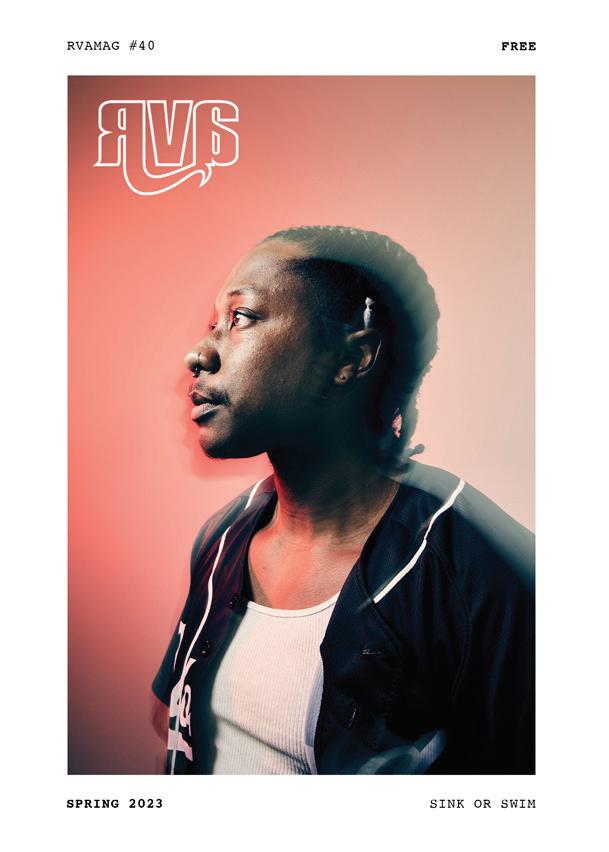
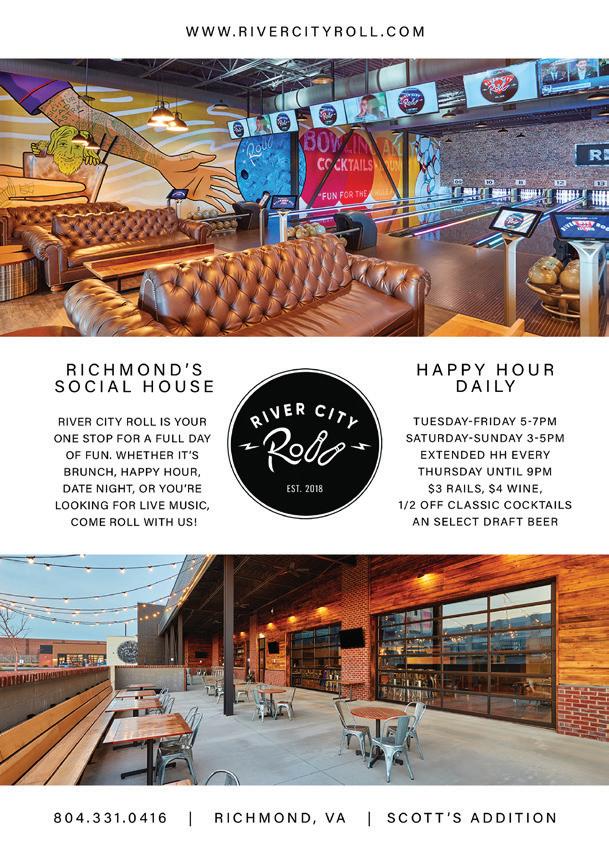
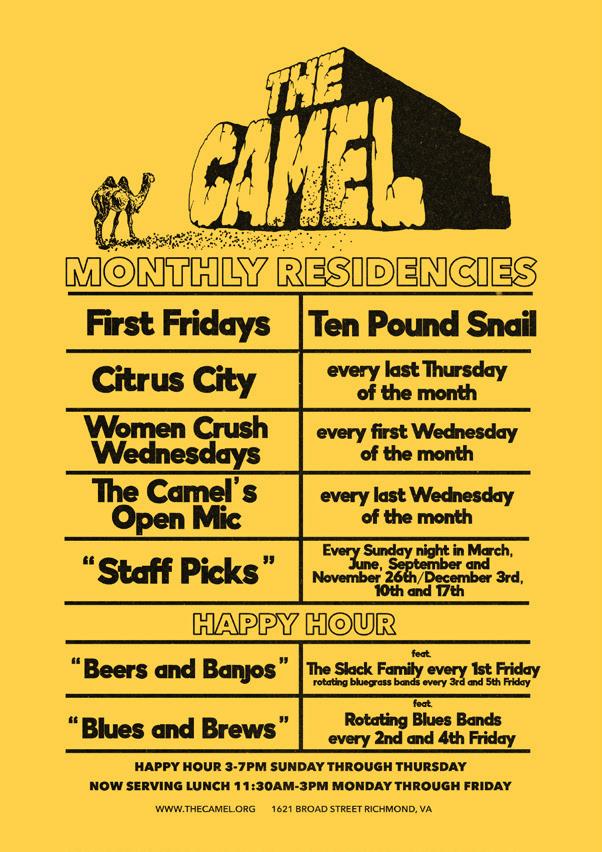

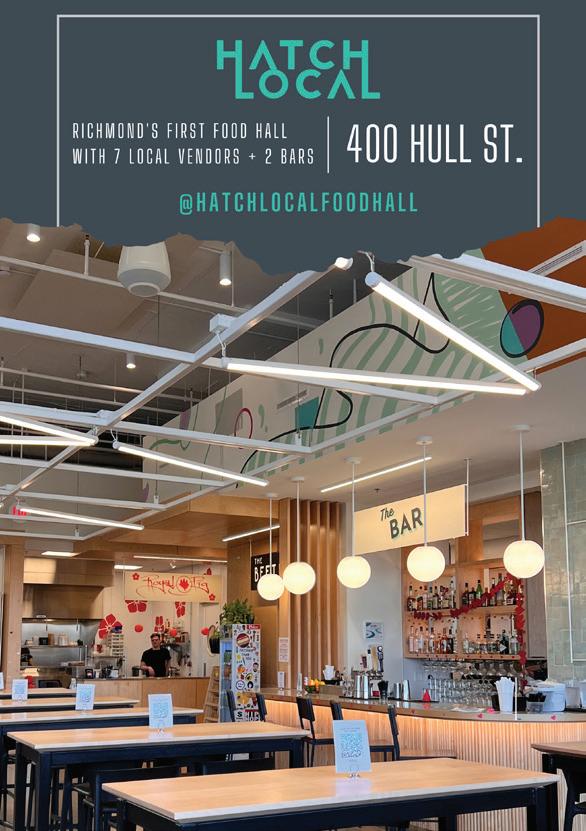
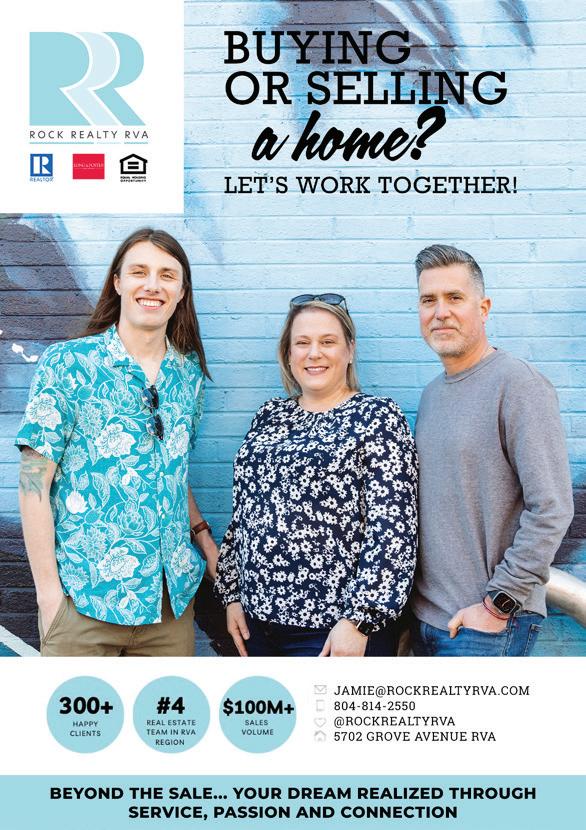
ISSUE 40 7 RICHMOND, VA Action T-Shirts Arefeh Abad Alejandro King Brad Cummings Brandon Fox Candace Faircloth of Long & Foster Real Estate Carola Rojas Chris Bernhardt Colin Matthews Deirdre Saulet Devon Rohr Elle Frierson Gavin Foster George Roberts Harry Blackwood Holly Walker Jennie Mae Skinner Jennifer Yu & Rachel Jackson-Leyco Jessi Renehan Jeremy Simmons Jeremy Parker Joe Martin Joseph Genest Joni Teague Justin Dray Katie Mae Katy Thomas Keith Herbert Kelli Yoder Laura Garrison Larry A. Jarrell Larry Blanchard Mac MacDaniel Matthew Giles Matthew Park Matt Wild Maxwell O Melissa Mannon Megan Driscoll Michael Recant Michael Shea Might Casey Mongrel In Carytown Mylo Brown Nina Exner Randi Upton Rebecca A. Ferrell Ricky P.P. RVA Beard League Ryan Lemar Sara K Eskridge Sarah Paquette Scott Clark Shaun Farrell Shima Razavi Susan Hribernik Thea Brown The Brain Tom Masterson TV Jerry Warren J. McCrickard Wirt Confroy
THE FOLLOWING
OF RVA MAGAZINE ISSUE 40 7 RICHMOND, VA
THANK YOU TO
SPONSORS
RVAMAG
RVAMAG #40 SPRING 2023 SINK OR SWIM RVAMAG.COM
RVA MAGAZINE CREATED BY
R. Anthony Harris
FOUNDERS
R. Anthony Harris + Jeremy Parker
PUBLISHER
Inkwell Ventures Inc.
COPY EDITORS
Audrey McGovern
Andrew Bonieskie
SALES
Kayte Stracener / kayte@rvamag.com
DESIGN
@majormajor____
WRITERS
R. Anthony Harris, Andrew Bonieskie, Justice Smith, Taylor Kincaid
PHOTOGRAPHY
Jonathan Mehring, Kimberly Frost, Joey Wharton, Jimmy Fontaine, Myles Brown, Larry Kong, & Michael D. Thorn
As we are in our 18th year in publication, we would like to thank the following people who contributed their time and talents to making this project possible. Thank you.
John Reinhold, Kimberly Frost, Jeremy Parker, Christian Detres, Landon Schroder, Adam & KC Sledd, Marilyn Necci, Brad Kutner, Tess Dixon, Ken Howard, Todd Raviotta, Gabriel Ricioppo, Charles Watlington, James Milner, Shahan Jafri, Anna Wittel, Long Jawns, Doddie Braza, MASS FX, Elliott Burton, Aimee Lauren, Amir AlQadaffi, Shannon Cleary, Ben Muri, Landis Wine, Lauren Vincelli, Jake Mayday, Karen Siefert, Phil Bowne, Thea at World Of Mirth, Norm at Katra Gala, Shannon Conway at Starlite, Fred Pinckard & Katie Davis at Salvation Tattoo, Mickael Broth, James Callahan, Chris Visions, Amanda Robinson & Prabir Mehta at Gallery5, Brandon Peck, Reef Clem, Conway Jennings, Jeff Smack, Bryan Woodland, Brandon Crowe, Eddie Wilson, Joey Wharton, Doug Nunnally, Stuntkid, Rachel Whaley, Addison Herron-Wheeler, Marc Cheatham, Marc Schmidt, S. Preston Duncan, Ryan Kent, Kathryn Whitley, David Kenedy, Scott Whitener, John Yamashita & Jason Henry, Aldo!, Jonathan Martin, John Taylor, Eric Shell, Amy David, Caley Sturgil, Dan Anderson, Mike Dulin, Teddy Gregson, Heidi Cregge, Evan and Jimmy at Kulture, Randy O’Dell, Hamooda Shami, Joe Vanderhoff, Davy Jones, Madelyne Ashworth, Elliot Robinson, Tony Foresta, Randy Blythe, Dave Brockie, Josh Lingerfelt, Dreuw Snyder, Taylor Womack, Reggie Pace, Gabriel Santamaria, Kelli Strawbridge, James Seretis, Mike Rutz, Black Liq, Jimi Foster, Cody Endres, Alison at Taboo, Dan Mulrooney, An at Mekong, Adam Juresko, Jon Donegan, Justin McClung, Ace Patel, Kevin Johnson, Casey & Marche at Rumors, Peter Szijarto, Chris Lacroix, Jimmy Budd, Teddy Blanks, J.D. Gavin, Tyler Scheerschmidt, The Camel Family, The Hadrywood Crew, Mary Heffley, Lisa at Venture Richmond, Steven King, Kayte Stracener, OURA, TEAM 8, Michelle Dosson, Matt Goins, Marissa Browne, Pete Humes at Punchline & Ian M. Graham (RIP)
SPECIAL THANKS to Artifex M. Hunter Haglund
All inquiries to hello@rvamag.com
Advertising information can be viewed at rvamag. com/advertising
RVA Magazine welcomes submissions but cannot be held responsible for unsolicited material. Send all submissions to hello@rvamag.com
COVER PHOTO
Jimmy Fontaine
The entire contents of this magazine is a copyright of Inkwell Ventures Inc. and cannot be reproduced in whole or in part without written authorization of the publisher.
HEADS UP! The advertising and articles appearing within this publication reflect the opinion and attitudes of their respective authors and not necessarily those of the publisher or editors. Reproduction in whole or part without prior written permission from the publisher is strictly prohibited. RVA Magazine is published quarterly. Images are subject to being altered from their original format. All material within this magazine is protected. RVA Magazine is a registered trademark of Inkwell Ventures.
2023 8
SPRING
SPRING 2023 8 RVAMAG
The modern world is a place of chaos and confusion.
We are bombarded with information from every direction, and the lines between truth and fiction are blurred beyond recognition.
It is a world where technology moves faster than our ability to understand its implications, where we are constantly connected but often disconnected from each other.
In this world, we must fight to maintain our sanity and sense of self, to find the truth amidst the noise and to hold onto what is important.
It is a strange and dangerous place, but also a place of opportunity and potential.
We must navigate it with care and courage, for there is no other choice.
Now is the time. Sink or swim.
H. S. T. A. I.
March 2023
ISSUE 40 9 RICHMOND, VA
Tyshawn Jones: “Skitching”
on our car. NYC, 2014
ROADTRIP!JONATHAN MEHRING
BY R. ANTHONY HARRIS
PHOTOS BY JONATHAN MEHRING

SPRING 2023 10 RVAMAG

ISSUE 40 11 RICHMOND, VA
Tyshawn Jones: “Skitching” on our car. NYC, 2014
Who are you? What do you do?
I’m Jonathan Mehring. I am a photographer and filmmaker, based in Richmond, specializing in action sports.

How did you get into that?
When I was in the sixth grade, a buddy of mine started skating. I grew up in the country outside of Charlottesville on a dirt road. He gave me a hand-me-down board and I became obsessed with skating, even though I lived in the middle of nowhere. I had to go down to this tennis court that was two miles away to try to learn to skate.
Then there was photography. My high school started a photography program around my junior year. The teacher for that class was by far the best teacher in my high school. I was probably a C student in high school. But I got so into photography, I started getting A’s. I was suddenly inspired. I would go to school an hour early every morning so I could get in the darkroom before classes started. I was in love.
Were you mostly taking photos of the people around you?
Yeah, so I realized I didn’t have a lot of natural talent for skating, but I did seem to have some for photography. I decided to take pictures of my friends, who were all better than me. We would skate all the Charlottesville spots and I always had my camera– just obsessively taking photos and developing them at night.
I wanted to go to school for photography. At the time, I was taking pictures of all the Dominion guys and I would send my best shots to Transworld and different magazines. Grant Brittian was the photo editor of Transworld at the time and he sent me this photocopied sheet of skate photography rules or instructions on how to improve and what they were looking for.
It was interesting; it was good. But it was just like, man, not only did I get a rejection notice, but I also got a sheet explaining how to do it.
Was he trying to encourage you though?
There was no communication. It was just like, here’s this letter. I think everyone who sent in photos
SPRING 2023 12 RVAMAG
might have got it. It did help, but it was also a little bit hard to swallow. I thought I was doing pretty good. Turns out I wasn’t.
Yeah, all your friends were telling you how awesome your work was, and then he’s like– not so much.
Yeah. I was like, “I got a friend who can grind a flat bar.” They basically came back with, “So what?”. <laughs>
You eventually become a part of a publication. What were you doing?
So I went to VCU and studied photography. I got really into Slap Magazine because two of my favorite photographers, Mike O’Meally and Brian Gaberman were working there.
And I was like, man, I honestly like these photos more than what’s in Transworld. Even though they’re rough around the edges and they’re not as polished, that’s what I liked about them. When I started sending my more artistic stuff to Slap, they called me up and they’re like, “Hey,
we like your stuff, keep sending it and we’re gonna send you some film.” I was freaking out.
This was while I was at VCU, and I had teachers telling me to leave skateboarding alone and that it was not worth my time. I was doing my art assignments and they were pretty average. But when it came to shooting skating, I could see myself getting better. But anyway, I finally get a photo published in Slap – it was a two-page spread. It was a shot of my buddy, Will Lee skating in Charlottesville. I thought it was so cool.
Since Slap was so supportive, I started giving them everything. I wasn’t spreading my work out to different magazines, because nowhere else was doing anything with it. My next idea was to go on a road trip with my friends Brian Davis and Rob Lee after we graduated. I was working valet at the Omni Hotel and had saved up $1,500. I bought a Nikon fisheye, which was $1,000.
Those are still $1000!
Car overheating somewhere out west. 2000 Road Trip.

ISSUE 40 13 RICHMOND, VA
Yeah, it hasn’t changed at all. So I got the fisheye and then had $500 for the road trip. And then Brian had $500, Rob had $500. And so we’re like, alright, let’s map it all out. I did the gas mileage using a map; I was drawing our line and totaling all the mileages up and I figured out that we could go if we didn’t stay at any hotels. If we camped the whole time, we could do a month.
Wow. Off $1,500. Gas was like $1.50 at the time, probably.
<laughs> Not even that. It was $1.29 or something. So the three of us packed the car and headed out. My idea for the article was to photograph all the pro skaters we were sure we were gonna meet and then compile it and write about our road trip and meeting all these pros. It wasn’t the worst idea, but it’s pretty hard to meet these pros when you don’t know anyone.
I’m taking pictures as we go through St. Louis, Denver, Albuquerque, and Phoenix. From Phoenix to San Diego, my car started overheating. So we had to only drive at night and then we had to stop every half hour and wait 20 minutes for the car to cool off.
Were you calling your parents at this point? Asking them to wire you money?
No, no, we never had any support. We were on our own. When we finally got to Ocean Beach, we slept in the car because we had driven all night long and it was 4:30 in the morning. We got there and we’re just like, fuck, this is gnarly.
We started meeting some sponsored skaters once we got to Albuquerque. We met DJ Chavez who was, I don’t know if he ever went pro, but he was one of the people that ended up be-

SPRING 2023 14
SPRING 2023 14
Ryan Simonetti - Melon grab at the Concussion Ditch in Albuquerque, NM. 2000 Road Trip.
ing in skate industry. Then we went to LA and met Adam Alfaro who later became a Black Label Pro. The people we talked to were up-and-coming skaters who were down to shoot with a random ass kid with a camera.

We were camping the whole time we went up the coast. Though we did stay in one hotel in Albuquerque. I think it was like 20 bucks a night. When we got to our room, the lady at the front desk didn’t just give us a key. She walked us to the room, I guess to see if it was okay, maybe? She didn’t have any shoes on and she was missing toes. Then we got to the room and there was a crescent moonshaped crack around the deadbolt–somebody had kicked the door in and knocked the entire mechanism off! It had been duct taped back on. We were so skeeved out, there were dead roaches in the drain of the bathtub. We just laid our sleeping bags on top of the beds.
Eventually, we make it to San Francisco. This guy I knew, Dave Rosenberg, took us around the SF area. He asked if I wanted to meet Mark Whiteley from Slap Magazine, who I had been corresponding with. We went and met him at his house. We were chatting, but it was a bit awkward. I thought we would get the invite to go to the Slap office, but we didn’t.
By the time we get to Seattle, we were out of money and tired. On the way back to Richmond, we blew a tire around Chicago. We had to get towed, which was the last of our money. We had just enough gas to make it back to Richmond– I don’t think we even ate.
When we got to Richmond, I called Mark to let him know we made it home. And he’s like, “What do you mean?” I’m like, “We met in SF? I was hoping to go to the office?” He didn’t even realize that was me. I was too shy to say, “Hey, I’m the
ISSUE 40 RICHMOND, VA
ISSUE 40 15 RICHMOND, VA
DJ Chavez - Backside 180 melon grab. Albuquerque skatepark. 2000 Road Trip
guy who has been sending you all these photos.” We kept working together and I ended up working for the magazine after that.
Did you write a good story after the road trip?
I wrote a story and sent it in, but nothing happened. Total fucking waste. Well, no, it wasn’t a waste. It was awesome; it was amazing. But as far as getting something published, it did not work.
But they started to tell me that they needed me to shoot pros. The rest of that summer, I would go to DC every weekend and I’d photograph all those guys. The Capital/Nicotine days were over but Pep Martinez (RIP) and those guys were still up there ripping. I decided to write an article called The Forgotten City and feature all these older pros who were no longer in the spotlight. That article finally ran. And it was 14 pages. It was huge. And that is how it all began.


SPRING 2023 16
@MEHRINGSBEARINGS SPRING 2023 16

ISSUE 40 17 RICHMOND, VA
TOP LEFT: Jonathan Mehring, Rob Lee, Brian Davis. 2000 Road Trip
LEFT: Rob LeeOllie over barrier. St Louis, MO. 2000.
RIGHT: Unknown ripper, Lien Air, Burnside Skatepark. Portland, OR.




RVAMAG RVAMAG
TOP LEFT: Travis Pulley 2000, 2004, 2014. SPREAD: Gilbert Crockett - Noseblunt slide, Vans Space 198. Brooklyn, NY 2019.

ISSUE 40 19 RICHMOND, VA

SPRING 2023 RVAMAG
Yellow Zip TopHervé by Hervé Léger
Vegan Leather Skirt with StudsAlice + Olivia
EarringsVintage Mexican sterling
Black BootsH&M
COSMIC GIRL
Photographer: Kimberly Frost
Model: Tatianna Jackson
Wardrobe Stylist: Geraldine Duskin

Makeup Stylist: Rachel Austin Boxley
Photo Assistant: Steven King
ISSUE 40 21 RICHMOND, VA
Nude Vegan Leather DressAlice +
Resin Earring sStylist’s
Olivia
own

SPRING 2023 22 RVAMAG
Faux Leather JumpsuitPaige Anessa
BraceletMoshino
HeelsModel’s own
 Black Faux Leather Dress with CutoutsRotate Birger Christensen
Pink Stone EarringsLacroix
Black Faux Leather Dress with CutoutsRotate Birger Christensen
Pink Stone EarringsLacroix

SPRING 2023 24 RVAMAG
Yellow Zip Top -Hervé by Hervé Léger
Vegan Leather Skirt with StudsAlice + Olivia
EarringsVintage Mexican sterling
Black BootsH&M

ISSUE 40 25 RICHMOND, VA
Nude Vegan Leather DressAlice + Olivia
Resin Earring sStylist’s own

SPRING 2023 26 RVAMAG MCKINELY DIXON
BY R. ANTHONY HARRIS
SPRING 2023 26 RVAMAG
PHOTO BY JIMMY FONTAINE
I saw the new video and loved it. Today I wanted to touch base with you about your move to Chicago, and your growth as an artist.
I haven’t grown at all. I’ve actually grown less. I became more of a hater since I moved to Chicago. That’s the first bit of information.
Lovely. I love that. I’ve been a fan since I first heard your stuff. With the video work and the new album, it feels like you’re moving on up, man.
It definitely takes time. Everybody in Richmond was there before everybody else heard it. But even back in Richmond, it was a communal thing. Everybody was proud of it, which is nice. It’s always good to have those affirmations.
How did the unrest and the Robert E. Lee statue down on Monument affect your music? Or did it?
I don’t know, it didn’t really affect me too much. I think that a lot of those things, especially towards black folks who exist within the artists’ community, can definitely be seen as a gesture of– not false hope because there’s progress within taking down those sorts of monuments– but is more so a sort of sleight of hand thing. It’s like, we took down this monument, and this should satisfy you for a little bit.
It was cool that Monument was a circle where little homies were playing basketball, and people were singing and stuff, but that should have been everywhere, you know? Those sorts of communal gatherings should have been everywhere, and then they took it away. Now it’s an inaccessible space, that’s just growing weeds. Like it was cool for that summer, and then they were like, Nah, we can’t have your little kumbaya out here. No more. So taking the monument down is progress, but it isn’t a celebration to me.
I love the new album, by the way. Can you speak on the growth between your first album and the latest album?
Thank you. The last album took three years. It was a well-traveled album, in the sense of distance and time because it started in 2018, maybe 2017, and spanned all the way to 2021. It became this thing where I recorded wherever I could. Now I’m lucky enough to have Nina and Lillian and Brooks and all these people working with me. But before I was fucking around and trying to find out what was gonna happen.
So a lot of the album is not very cohesive sonically, because I recorded it wherever I could. But this new album was really dope because me and Sam of No BS! Brass came together with a bunch of concepts. I wanted to make an album that was recorded in the same place, whether it was a studio or a home.
What prompted your move from Richmond to Chicago?
I was in Richmond for school, and then I stayed there for another 12 years. I thought I did everything I could there. The city is way different than it was a decade ago. Rest in peace, Strange Matter. So many places that catered to the middle ground that a lot of people existed within are gone. It felt like if I wanted to continue to grow outward at this point in my life, I’m gonna have to find a place that is a little bit more of my speed.
Chicago had that magic. There have been so many little moments of magic in the past year because now I live in a neighborhood that looks like me. That’s the other thing about Richmond. It’s very segregated. Brown people to the south, black people to the north, with white folks everywhere else. I think that Chicago is really nice because everybody has their own space. And that gave me enough space to see how black people operate in this commu-
ISSUE 40 27 RICHMOND, VA
ISSUE 40 27 RICHMOND, VA
nity. I’m inspired a lot quicker, which is good because I have to make it out a lot quicker. I’m not used to making an album in, I don’t know, fucking seven months, or whatever I did.
Chicago has a rich history of hiphop and jazz. Do you have any favorites?
Chicago do got a lot of people up in this bitch. There are obviously the staples like, the Sooper Record group. There’s NNAMDÏ and TITUS–they’re really big. Then there are a lot of younger artists and smaller artists that are coming up in the rap scene. We got Josh Virtue, who is really cool. A lot of those people started out in punk bands. And now they’re rappers, but they also do jazz. I think the dynamic of moving genres is way more fluid here and way older.
As much as I love Richmond, I was the only cat doing rap with the instruments for a while. And that was what set me apart, which I’m very thankful for. It’s a privilege to do that. It’s just here, I can go see someone else that does that and it’s inspiring. Richmond definitely has its own groove. The groove is just not as fast as I’m looking for at this point in my life.
Yeah, absolutely. So, what are you excited about? What’s coming up? You’re on tour, right?
Yeah, we got a tour coming up and an album coming out. I’m going on tour with Tank and the Bangas in March, which is really exciting. South by Southwest is fun too.
We also have a couple more singles coming out in March. Run Run Run is one of them. And then we got a live video for” Tyler Forever” and a live video for ”Run Run Run”. We went through Spacebomb in Richmond and Spang in Richmond too.
You deal with a lot of difficult subjects. Do you feel any pressure

on the commercial side with trying to bridge over into the mainstream?
With the album For My Mama And Anyone Who Look Like He r, I think if it focused more on a commercial aspect, people wouldn’t enjoy it as much. It was kind of a big deal to start the record with that sporadic jazz song “Chain Sooo Heavy”, and then end it with a six-minute-long harp song.
With this one, the key to that commercial success– which I haven’t even found yet– is making the songs shorter and catchier. That’s what I really focused on. Like in the song, “Sun, I Rise” where the chorus is, “I took my chain into my shirt, you niggas never finna catch me,” that sort of melody. But the song is still dense. I’m not trying to lose throwing a bunch of instruments on top of shit, but I am trying to clean it up a little bit. Because now it’s not just me.
That’s also the key to the commercial switchover is having other people take a listen. If it was just me, every single song would be six minutes long and have a whole instrumental breakdown in the middle, and everybody would be fucking mad at me. I’ve found friends and they’re asking, what if this were two and a half minutes long instead of five? And we figure out a way to pack everything into that?
From the outside looking in, the biggest thing that I’ve taken away between the two albums is, you’re a
SPRING 2023 28 RVAMAG
SPRING 2023 28 RVAMAG
spoken word poet on your earlier albums, and then you’ve now condensed it and made it more poignant.
Exactly. My last album was spoken word like you were saying. It was a really long, beautiful book. Whereas this one, the book is moving a little bit too fast, but the pictures are still really nice, you know? You feel it throughout the first one, but with this one, you get to the end and you have to ask if you still feel that love that you felt from the beginning. And you do– so you start it over again. I think this one will have a bit more replays. “Never Will Know” is my most popular song on Spotify now, and that song is just six minutes of whatever I could fit. I was putting whatever I found in that song, which was cool, but this one is definitely more condensed.
Let’s talk about your favorite Richmond musicians real quick.

Yeah, put a shoutout section. We got Alfred. They’re on every record I’ve ever done and also did the cover art for “Tyler, Forever”, and “Sun, I Rise”. Ice Cream Support Group puts on crazy dance black, brown, and queer dance parties– really beautiful stuff. My friend Monica just dropped her first hardcore record. It’s some punk ass name– it’s called Ordinate . Shouts out to everyone else in the city.
Thank you, McKinley, and congratulations to you man. We’re all excited for you in the city. You have fans here and love here for sure.
Thank you. I miss the city every day.
29
ISSUE 40 29 RICHMOND, VA
@FREEMCKINLEY
BY JUSTICE SMITH PHOTOS BY JOEY WHARTON

SPRING 2023 30 RVAMAG TCRAP
I wanna know the story behind Trapcry. The first time I saw the name, I was like such an iconic name. It’s very timeless. Tell me what it means and do you cry often?
RAP
I do cry a lot. <laugh> I cry when I’m watching movies all the time. But trap music was like this big thing at the time and I wanted my perspective in it. Cause usually I would make reference tracks, like well this will be for Rihanna, this will be for like Britney. I would write from that perspective, and I’m like, well, I want to do the same thing, but I wanna make it for me. And it wasn’t hypermasculine, like hyper-masculinity is hip hop’s thing, you know? I felt like Trapcry is a rebellion. It’s a different perspective. It’s not that hyper-masculine perspective that was popular in the nineties. I feel like hip hop doesn’t take music seriously unless it is that. And for a minute I was like, okay, I’m doing hip hop, but then it just became my own pop thing and it’s not even what I first started out being. I was sure about my sexuality then, but it was just like, how do I want to portray it and brand it? And this was all in like 2013. <laugh>
I wanna talk about how I unapologetically queer your music is. When I read your lyrics, it feels very biographical. I feel like I’m reading very specific memories and experiences. And it may sound obvious cuz that is the life you’re living. But as a musician, you have the option to paint with broad strokes and kind of beat around the bush or keep some things private and some things public. Is it intentional to thread your queerness in your art? And how does your art interpret your queerness? How does your queerness interpret your art?
I think being a gay person in music, now, you don’t have to be quiet. I mean, I already told you I’m gay, so like, what now? <laugh>. I can just be as revealing as I want, but also I feel like sometimes as Gene it’s different from Trapcry. I like to push the boundaries with who people can perceive Trapcry to be because it’s a hypersexual image and there’s nothing Trapcry can’t do. But like for me, I’m not always there. The songs I put out, they’re all real because it’s how I feel and if it’s not real, it’s how I wish I could be. Like I said, I’m inspired by my friends a lot. And I just feel like as a gay person, I don’t have to censor myself. I can just put it all out there because they’re already beating us up about our identity. And there’s always gonna be somebody that can relate to you. Whatever I put out doesn’t matter, somebody’s gonna be like, wow, this song meant something to me or like, I can identify in this situation. There’s so many stories to tell and I feel like you can’t really live all of these situations. Like, it’s probably unrealistic. But, there is a piece of me in each song <laugh>, there’s something there, but it’s usually up for interpretation. It’s not always exactly how it seems.
Can you talk a little bit more about the dichotomy of who Gene is and who Trapcry is, and what points do they intersect?
Growing up as a student of Beyonce, she had Sasha Fierce and I feel like that’s what Trapcry is for me. There’s definitely moments in my life that I feel like this is not Trapcry. Trapcry is so outgoing, you know, my highest self. But, you have to keep a piece of yourself for yourself. There’s
ISSUE 40 31 RICHMOND, VA TCRY
just some things you have to keep private. With social media it’s like post, post, post this, post this. And I do post a lot, but not all of it is personal. It’s okay to be vulnerable. It’s just like, not everything is for everybody.
I know there’s a good amount of artists that put themselves in the camp of a recording artist: I make music because I like to be in

You kind of let everything go at the door and you can be who you want to be. It’s super sexy, super fun. I’ve always been a studio artist long before I ever started performing shows, and then when I did do it, I didn’t know that it was going to unlock something. It made me feel liberated. I feel like a lot of people at my shows are going through the same things as me. And even the shows where people probably can’t relate, I feel like them seeing me in my truth liberates them too. Because a lot of times you’re in this box of who you think you’re supposed to be. But coming into my thirties, which is when I started performing, it’s like, oh, you think this is who you are? I had to realize that Gene and Trapcry are two different things. And that’s okay. As Gene, I think I’m all figured out. And then Trapcry is like <laugh> I’ve got something else up my sleeves.
What I’m hearing is something kind of takes over you when you are performing.
the studio and like editing. Then there’s others that make music purely to perform it, to engage with people. I would say you’re probably a combination of the two. When I see you perform, the energy is so intense and visceral, it’s what I would imagine your music would come to be. But for someone who hasn’t been to a live show of yours, describe the experience of a Trapcry show?
That’s the vibe. It’s about just letting everything go and having a good time. Forget all we went through this week and let’s just party and be whoever we want. There’s no judgment. Nobody can judge you but yourself, and you don’t even need to judge yourself here. You need to just love yourself.
Okay, I wanna zoom out. I want to talk about music in general. What do you see as someone who has two decades of music under their belt. Been in the industry for a minute. What do you think is next for music as a whole? What direction is music heading in?
Hmm, I don’t love music right now.
SPRING 2023 32 RVAMAG
What don’t you love about it?
It is so accessible, right? And this is a good thing. Like accessibility is good because not everybody has the same means, but I feel like with accessibility, you have people who have big platforms and because they have access to music, they’re just putting out whatever. And they’re gonna get the algorithm going towards them because
the algorithm will catch it again. It’s like playing a social media game and it’s not even about the music. So I hate that <laugh>. I think the good part about that is I can just make whatever I want and there’s no pressure. Like, I’m not signed. But at the same time, I do wanna be heard. I do feel like there’s a place for me whether or not the algorithm or anybody recognizes it. And that’s why I say, Richmond doesn’t know what to do with me. But I love Richmond so much. So I’m here, you know? I think there’s something new about the Richmond music scene right now. And I’ve been here for a bit. So I kind of saw what it was before the pandemic, and after the pandemic it’s turned into something else. I feel like as a collective, we’re on the verge of something. But we have to get out of the local mindset. Just be who you are as an artist and do your thing.
Now, what do you see as the future for Trapcry? And you can talk about the immediate future if you want to tease something that is coming soon, but also you can talk on a big scale. Like what do you see five years, 10 years, 20 years?
Oh my God. I know there’s gonna be another big release for me. I don’t know when that’s gonna be. But it’s coming.
they have all these followers and resources. And then like little people who actually make really good music, they get looked over. Someone like me, I’m not gonna get the playlist placements and stuff like that. I’m just gonna get first week’s radar for a couple weeks. It’ll hit for like a month and then everyone just moves on to the next song. Sometimes I even have to re-release something so that
An album or?
Definitely an album. Like I have so many singles right now and they all need to be put on something. I definitely have an album’s worth of singles. And there’s songs I perform all the time that I just haven’t put out, and it’s funny that some people know those songs better than what’s out on the internet <laugh>. I know I wanna do

ISSUE 40 33 RICHMOND, VA
videos. I wanna do a big campaign for one big project. I don’t know if it’s gonna be this year or next year, but it will be a body of work that tops anything I’ve ever done. And people loved my last project. I loved that project. But I want to make more art that speaks to the time we’re in now. And I think the next project will do that. And this next one is gonna be very pop star <laugh> it’s dancing, it’s sexy, it’s fun.
More than anything, I just want to keep making good music. I have so much music that’s not out and I like sitting on music and then I’ll release it on my own time. I wish I could commit to doing things faster, but it feels too robotic to just release project after project. My last album was dangerous. That was 2020. Sometimes I ask myself, what would Rihanna come out with now? Like I said, I’ve always wanted to be a pop star, but I feel like nobody else is really doing that here. Making music with a commercial twist, but like also crossing over into urban and alternative themes. People are doing that, but not in this locality. And you know, I think it’s easy for people to look at me and be like, you are like Frank Ocean or Little Nas X and like yeah, I think I do have some songs that fit their aesthetic, but I definitely make songs that are unique to me too.
center hip hop a little more. I feel like the country, bluegrass, and punk scene is always getting the support. And so when I’m getting put on shows and stuff, sometimes it’s like, would I get booked for any of these shows? Cause I’m not even strictly one thing. I think people hear my music and they definitely think dance, dance, dance. But I have so many things I can do. I definitely wanna do that with the next album. I think that’s where I’m headed. Just like being able to reflect on the Richmond experience. Hopefully it’ll be a cool summer and if I push hard enough, maybe I’ll have a project out this summer.
...I don’t mind Richmond’s
I don’t mind being Richmond’s Pop Queen <laugh>. Because I mean, nobody else is doing it <laugh> That’s why I love the community here because everybody has their own thing. Everybody has their own place. I do think that they could
Your music definitely sounds like summer.
I always have a summer song. So I just need to come up with a summer song like nowish <laugh>. I’ll see what happens with that. I don’t know, like, I go in and out of being creative. Like sometimes I can go weeks without recording and then a song will pop up and I gotta record it.
Well that just shows that it’s something divine and it’s real. It’s not, now it’s time to make another hit. You gotta wait till inspiration strikes.
Right. If I’m not saying anything, I don’t need to. I don’t need to be the only one with the mic. But I have something to say again, and the mic is in my hand.
@TRAPCRY
SPRING 2023 34 RVAMAG
mind being Pop Queen...
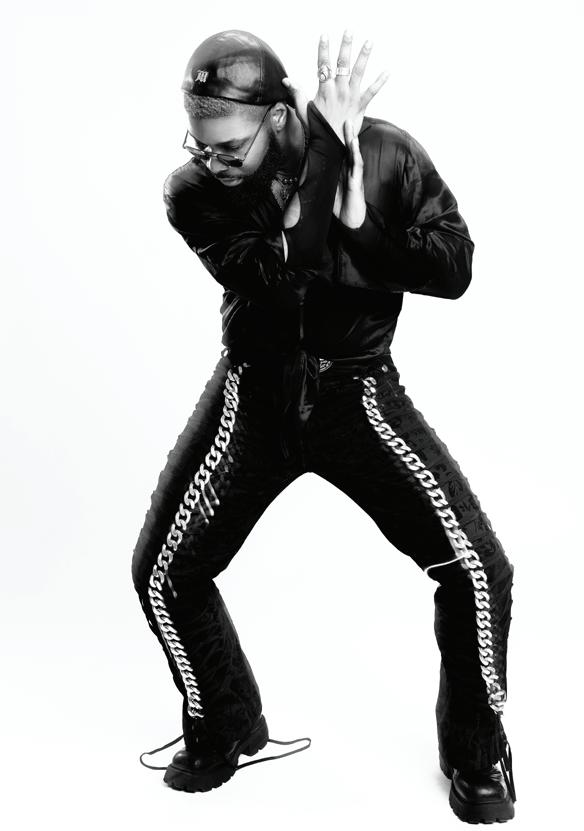
ISSUE 40 35
TAYLOR
T E R R O R C E L L

D. THORN SPRING 2023 36 RVAMAG
BY
KINCAID PHOTOS BY MICHAEL
This is Taylor from Beggars; I’m talking to Joey from Terror Cell. Does the name Terror Cell come from anything?
It’s just a cool name.
Gotta have a cool name. Tell me about how you guys came together. How’d you all meet? What’s the dynamic of the band?
Terror Cell originated as an offshoot from a band that three-quarters of us were in prior called World Waker. It was me, Steven, and Atreyu. We had been playing music together for eight years, all living in Richmond. We’ve all been in and out of a couple of different bands since high school. I had some shitty power violence demos that I recorded on a laptop that Atreyu encouraged me to try to do something with.
Atreyu is the other guitarist?
Yes. Hunter is the drummer and Steven does bass. And then Wesley is our new guitarist who’s been filling in for Atreyu, who’s in his 12th year of college.
And you do the vocals?
Yeah. And guitar. So World Waker wasn’t really doing anything and Atreyu, Steven, and I were getting sick of it. We turned a couple of pretty bad power-violence demos into some songs that weren’t power-violence at all. That eventually was our first EP.
Were you plucking out old ideas and filling them into something new?
Everything was super Frankenstein. Yeah, we were looking at the demos and were pretty quickly like– we don’t want to do this. But this riff is kind of hard. So we’re going to take that piece and run.

You said power violence, but you guys have this ambient, but super
big sound. And your lighting setup is super dope too. What are your stylistic influences?
You hit the nail on the head. The name of the game is heavy and ambient, for the most part. Sometimes the balance is a little bit skewed in one direction or the other. I would say it’s not quite post-metal, not quite hardcore, and not quite mathcore.
The tempo on the records you guys put out has some hyper-fast blast beat parts. And then it’s complemented with this slow cloudy atmospheric part.
That’s something I was originally a little bit worried about– having it sound like two EPs from two different bands stapled together. But I think we found a decent medium. We’re editing ourselves, but also doing what we want to do.
You guys put out a new record, which is called Caustic Light . What label is it on?
Fisher King Records. It’s actually a label that I started right before the record came out. Right now, the roster of the label is us, our friends in Flesh Machine. Doll Baby, a band from Boston called Crippling Alcoholism– who are amazing, DB Cooper from New York, and we actually just signed Camp Werewolf today.
Did you have a production element involved in Caustic Light as well?
I did all the tracking and all the mixing and then Brad Boatright at AUDIOSIEGE did the mastering.
You’re on top of your stuff.
I wear a lot of hats.
How many venues did you guys do for your last tour with God’s Eyes?
God, I don’t even know. I want to
ISSUE 40 37 RICHMOND, VA
say we were out for 10 or 12 days. We did in northern Pennsylvania down to southern Florida. The Camel show was on day 2. Those guys are mind-blowingly good.
They’re amazing live. Any local shows coming up?
Yeah, we’ve got one at Ipanema with Thin and The Wind in the Trees, who are both phenomenal bands. And we’re doing a battle set with Black Matter Device, which is a first for us. That should be fun.
year and the single they dropped is sickening. Their new shit is amazing. Black Matter Device is killing it. There’s so much good shit– Enforced, Flesh Machine, Antichrist Siege Machine. There’s so much good music, it’s actually hard to keep track of. I know I’m missing like 30 people.
What’s next for Terror Cell?
We’re working on something right now that I don’t know if I’m allowed to talk about along with a couple of other bands. Then we’re casually working on an EP for 2024, or late 2023 depending on how fast that process goes. I’m tentatively planning on producing and engineering that as well.

A battle set? Please elaborate.
I don’t know what the logistics are going to be, but I’m assuming it’s going to be a mess of both bands setup and then alternating songs.
Who in Richmond right now excites you? Who do you want to play more shows with? And what do you think about Richmond in general as a place where hardcore metal bands blur genre lines?
Killing Pace is destroying it right now. I think that sound is something that Richmond’s been needing for a while. Gif from God is putting out something new this
I’m renting a house right now and I converted the entire downstairs to a home studio. So my dining room is a control room and my kitchen is a drum room, which is not the most convenient, but it sounds great.
You can eat food off the bass drum.
Something like that. They’re no longer very functional rooms, but it works for a studio. And the 16foot ceilings help.
As for what else is coming next, we’re playing a show with The HIRS Collective on March 26th at Fallout. That’s going to be a really good show.
@TERRORCELLNOISE
SPRING 2023 38 RVAMAG

IG: @FREEMCKINLEY ISSUE 40 39 RICHMOND, VA
BY ANDREW BONIESKIE
HolyRoller!
PHOTO BY JOEY WHARTON

SPRING 2023
40 RVAMAG
My first experience with the local Richmond band Holy Roller was at The Camel when they were performing under the name Big Mama Shakes. I was 19 years old, new to the city, and mostly ignorant of the thriving Richmond music scene that I would soon find myself enthralled by. While my memory is hazy on the specifics of that evening for a variety of reasons, I do remember an intense and penetrating sound that shook me, and the audience, to our core. It was a sound that kept us moving all night long, and I found myself sinking further into the lifelong addiction that is Rock & Roll.
Bryce Doyle, the current keyboardist for the band, played guitar throughout his childhood but didn’t start playing piano until 2012 before joining Holy Roller in 2015, just in time to play a pretty important show. “My first time playing piano in front of a crowd was a sold out show at The National opening up for Nathaniel Rateliff. I was shaking, I was so terrified,” said Doyle. Coming from a military background as a VMI cadet, Doyle grew disenchanted with the program and began teaching himself piano, now daylighting as a motorcycle repair technician.
Cason played saxophone in the fifth grade before moving onto bass guitar in middle school which he would turn into his main instrument. The summer before his freshman year of high school he ran into a young Heck at a band camp and the two struck up a friendship, with Peter Cason saying “He wouldn’t leave me alone!” Cason books shows for a variety of smaller venues around town including The Camel where he frequently works the door.
Ryan Davis was introduced to percussion in fifth grade and has been playing ever since. I
acknowledged his commitment and the seriousness of his background while he shrugged his shoulders and humbly said, “I was just jamming out to AC/DC and other bands I found on Guitar Hero.” Davis toured around for a while playing with different churches before moving down to Richmond in 2013 to study dance at Virginia Commonwealth University. Davis dropped out after three years but quickly got a job as a percussion accompanist for the various dance classes at VCU eventually moving on to perform the same duties with Richmond Ballet, and then meeting and joining Holy Roller in the early months of 2019.
Rebecca Rafferty “grew up in a really musical family,” mentioning that every member of her immediate family was a musician to some degree. She began writing songs at the age of 12, and formed her own project Rebecca Rafferty and the Wakes that performs regularly around Richmond. Cason was introduced to Rafferty through a mutual friend and started booking her local shows. She was asked to sing harmonies in Holy Roller, and her first gig with Holy Roller was opening for Judah and the Lion in December 2018 at The National; something of a running theme for the band.
Heck began playing guitar at the age of eight. He attributed this to his mother who lived and played music in Nashville until she moved to Richmond to give birth to Heck. While Heck says the practical application of his skills came from his mother, he credited his father with actually helping him discover music as he claims he was constantly listening to classic rock radio stations. “When I was with my Dad I was listening to music, and when I was with my mom I was learning music,” said Heck. He began writing his own music
ISSUE 40 41 RICHMOND, VA
throughout his middle school years before meeting Cason at the start of High School.
Having formed bands off and on in high school and beyond, Cason and Heck finally got together a group of people they felt really had something, and after quitting the other bands they were in at the time started calling themselves Big Mama Shakes in 2013. The band played regularly over the course of the next few years culminating in an album release in 2015 titled As She Does. However, in 2018, having gone through multiple lineup changes and confusion with the band Alabama Shakes, they had made the decision to change their name, they just didn’t know what. On the 4th of July Cason went to their Facebook page to see if they could change their name, and without realizing it he had accidentally officially submitted the name change before leaving his phone at his house to go down to party on the James River. Other members of the band were notified of the name change – even though they had not all necessarily agreed – and they made the choice to commit at that moment. Said Cason, “I had like 10 missed calls from the band members asking, ‘are we doing this?’ and I’m like, ‘we already did it!’”
In December of that year was when Rafferty joined the group and the lineup that still stands to this day was solidified. 2019 started with the release of the selftitled first album as Holy Roller, and that year was all about the band establishing themselves in their roles and filling out their sound, but of course something terrible was looming just over the horizon. “By the time we finally got a little bit of wind under our wings was when the world shut down,” said Heck. While COVID killed many young and small time
bands around Richmond, and indeed, the world over, Holy Roller managed to stay together. Heck attributes the group staying together mostly to Davis who had a solo project that he was recording at the time and pulling from the members of Holy Roller to keep chipping away at over the course of 2020. “That kept the ship afloat,” said Heck. “The process kept me going, and reinforced that we could still do stuff,” responded Davis. Cason acknowledged that, but said, “really, we just stayed friends. We kept hanging out with each other.”
The music of Holy Roller is based in the classic tradition of Rock and Roll, but the Nashville influence of Heck is felt in almost every aspect of their sound. While As She Does offers consistency in tone, Holy Roller provides a lot more variety in not only tone and sound, but also lyrical and musical content, giving the whole album an air of unpredictability. On the opening song “Raised Alright” there is this beautiful free rhythm section with trills on the acoustic instruments under Heck screaming “oh lord!” accompanied by the band’s beautiful harmonies. The next track “Honey, Where’d You Sleep?” starts off with a country sound and retains it for the majority of the song before launching into an intense breakdown with avant garde guitar effects before transitioning into a riff that wouldn’t sound out of place at a punk concert. This ebb and flow continues throughout the whole of the album such as with the minimalist “Death Letter” in which Heck explores a host of dark themes surrounding death entirely exposed for the majority of the song. Rarely featuring anything more than just Heck’s low voice, a guitar and an electric piano, it stands in stark contrast to
SPRING 2023 42 RVAMAG
its predecessor, “Muscle Up” a powerful anthem with a choir singing about the hardships of romantic malaise and an absolutely killer electric guitar solo.
If Holy Roller’s sound excites you then you should be stoked to hear that they are releasing an album later this year. At Heck’s announcement of this Cason jokingly screamed “you said ‘this year’, why would you do that?!” to which Heck responded in a sing-songy voice, “because if it doesn’t come out this year I’m gonna become a fisherman!” While they have little to share in the way of details fans of the band can rest assured that we will be getting some more music before the year’s out.

Holy Roller are an exercise in finding and filling a niche; a long time band that only improves as they age, find the right people, and the right sound. Cason likened themselves to a pot of chili that gets better the longer it cooks prompting the room to crack up with Heck declaring, “that’s us: old chili!” The metaphor isn’t lost on me entirely though, as they have changed some of the people many times, always mixing up the ingredients, but the main course has never changed, all the while they just keep on stirring the pot to see what happens next.
@HOLYROLLERRVA
43
R. ANTHONY HARRIS RVAMAG
LU XX IE NN E
PHOTOS BY Lucienne Nghiem

BY SPRING 2023 44
I always say your name like Luxzine. But someone said it’s actually Loose-zine.
It’s all good. I always say– anything said with love. My real name is Lucienne. I guess a lot of people call me looks Lux on the internet. I don’t really know how the name started, but I like it. It’s cute.
What do you do?
I’m from Richmond and I’m a photographer. I also style, and love to act as a creative director. And I do it full-time now. This is my second year doing it. I hope to get into more tour work this year. I’m definitely thankful to RVA Mag; I think I got my first PhotoPass from you guys about five years ago maybe?
How long have you been shooting photos?
Six years this year. But I started really taking it seriously three years ago.
Did you go to school for photography?
No, but I did take classes in high school. I had a photo class and a graphic design class. Graphic design caught my eye and the teacher really taught me how to manipulate in Photoshop.
Your photography is very feminine and dream-pop-based. Where does the inspiration for your photography come from? Is it a specific era? I see some 70s disco and modern techno in it.
Yeah, my favorite genres of music are pop and hyper pop. I love the 70s Disco vibe. I get most of my inspo from early 2000 movies. I love 13 Going On 30 and all of the girly movies. I’m interested in how those girls in the movies dressed and how they paired accessories, like earrings, with their clothes. I try to get colors to pop. I love spark-
ly anything–I love pink and red and purple. Love the show Euphoria.
How’d you get into event photography?
I used to live right by a coffee shop that did open mic nights on Thursdays. So still to this day, Thursday is my favorite day. When I was in high school, I really wanted to be a makeup/beauty YouTuber. So I got a little digital camera and I started bringing it around to the open mic nights. And I was like, wait, it’s fun to take photos of people who are performing. I was enamored, I would stay really late. I’d be the last one there.
Later I got disposables from CVS and I started doing photography by shooting birthday parties for my friends, like sweet sixteens. I’d get my photos printed at CVS or Walgreens. One time someone asked if they could pay 20 bucks for one of my rolls of film and I was like wait, you can make money from that? I thought it was so much fun and I just kept doing it. I’ve been doing it ever since.
I definitely started on film. The photo class I took in high school was film-based and that taught me a lot, like how to shoot with colors and how to get the lighting right. I did give up the YouTuber dream but I definitely still kept up with photos. I’m really thankful to have lived and grown up by that coffee shop. They don’t do open mics anymore, but I’m hoping to find another one in Richmond.
I snuck my camera into the Bradbury one time five years ago and that was the first show I had ever been to by myself. I had no idea what I was doing. I had no idea that there was a gate in front of the stage. I remember thinking, what is that? Why are photographers there? I have a camera– why can I be there? So I tap the guy’s shoulder in the front and he told me that I had to have a press
ISSUE 40 45 RICHMOND, VA
ISSUE 40 45 RICHMOND, VA




SPRING 2023 46 RVAMAG SPRING 2023 46 RVAMAG




ISSUE 40 47 RICHMOND, VA
pass. He set me aside and explained to me what it was and how to go about getting on. I was like, Whoa, I have no idea what any of this is. But it seems really cool. I did a Google deep dive when I got home. And yeah, I’ve been doing it ever since.
That’s when you hit us up, right? Yeah, it was about that time.
Your work has really matured in the last year and a half. Can you talk about that transition and where your career is going?
I think I just started taking it seriously. Versus doing casual shoots and casual approaches. Over the last year, I put a lot of thought and effort into how people are dressed and the shoot location, and the lighting. Through friends that are into YouTube, I learned more about lighting and editing this year. I found my own style. I’ve always had a kind of colorful style, but I think I’ve finally found something that I’m happy with and that I’m sticking with. I’m using warm and disco-inspired colors. I’ve also tried to be as booked and busy as possible. And practicing really often is important. I hope I’ve grown over the past year.
Definitely. You mentioned before the interview that this is your fulltime gig now. Was it scary to take that leap?
Very. I used to be a swim teacher and I was happy to quit. Committing to it was scary and stressful, but I think I love it so much that it makes it worth it. I have a lot of friends and people that support me and are willing to help out and assist– they let me borrow clothes for shoots. Having a close loving group of people around you that are supportive is huge.
What are you excited about for this year?
I’m really excited to start traveling more for gigs. I was in New York a couple of weeks ago. That was the first time I was booked for a photoshoot in New York and the whole experience was eye-opening. And really, really nice. I have a couple of photoshoots booked for the month of March in Nashville that I’m very excited about.
So yeah, I’m looking forward to going to other places and being not exclusively Richmond-based. Although, you know, my family lives here. I’m from here, and it’ll always be home.
What do you feel that, as a creative person, Richmond provides for you?
Having grown up in the Richmond creative scene, I feel like everybody knows each other. That’s helpful when you’re trying to get started versus if you had grown up in New York, getting your foot in the door would be harder, just because it’s so concentrated. There are fewer artists here compared to other major cities because fewer people live here. I like the fact that everyone knows each other. There’s a sense of community here, which is unmatched in a lot of other major cities. I loved being raised here because of that.
Almost anybody can pick up a camera and start going, right?
Totally. And I hope people do. Make friends here. I think that’s the only way to get your foot in the door. And don’t be afraid to ask for help.
@LUXXIENNE LUXXIENNEN.WORK
SPRING 2023 48 RVAMAG
SPRING 2023 48 RVAMAG

ISSUE 40 RICHMOND, VA
B $ B
 BY R. ANTHONY HARRIS PHOTOS BY LARRY KONG & MYLES BROWN
BY R. ANTHONY HARRIS PHOTOS BY LARRY KONG & MYLES BROWN
SPRING 2023 50 RVAMAG
Let’s just go down the line. State your name and what you do.
Illya:
My name is Illya. I’m 20 years old. I do residential infrastructure HVAC, I’m an apprentice. And I ride bicycles with these guys. They taught me that riding bikes can mean slowing down around the homies and taking your sweet time with the ride. I thought that was really cool.
Amon:
I’m Amon. I’ve been biking with Broad Street Bullies for a while. During the pandemic, everything got started. I mainly film the Broad Street boys’ ride. I love that aspect of it– just being on the scene, capturing everyone. Capturing a glimpse of the ride-out every week.
Miles:
I’m Miles. When I first was invited on a ride-out I didn’t know how I felt about riding bikes. But once I started riding my bike, it became that stress relief that I needed from everyday life. And I think I’m so attracted to it because I do work in community psychology and Broad Street Bullies is that work. Everyone can forget what they’re doing at home and just ride bikes for two hours, not even worrying about the chaos of life. I have been through a lot of shit these past two years or so. But now these are the homies, and these are my brothers for real.
Bradley:
My name is Bradley. One thing that I’d like to talk about is how I got into bike culture. When I started riding, about six years ago, I was going to VCU at the time. I was looking for a job. I ended up meeting a few dudes that were couriers for Quickness RVA. Our homie Jay actually helped to start it.
He can’t be here because he’s over teaching in Thailand. He’s been there for about two years now. But he got me into Quickness and I was a courier for like a week. Rip Robin. They were another cyclist who is unfortunately gone now.
They were in New York when they passed away from an unfortunate incident, But Robin was a big part of the scene for me. I met Salad at Robin’s Memorial ride-out. I saw him popping it up– doing wheelies at the memorial. At that moment, I wanted to learn how to wheelie, so we all started hanging out.
Salad:
I’m Salad. I was there at the beginning. I’m a founding member if you want to say that. I’m born and raised in Richmond and grew up skateboarding.
When the pandemic happened and everyone was suddenly outside, we started going to MDP to meet up and ride around. The bike life scene reclaimed itself with the pandemic. So we were just like, yeah, let’s do a ride-out in Richmond. In New York, Philly, Miami, and all over the West Coast, they do ride-outs. I would see videos on my Instagram of groups of 800 kids all riding out together. I knew we could do that here. I was connected to a lot of people that did Critical Mass who have been in the Richmond bike life scene since the 90s. I can’t step on toes, so we had to schedule it around their rides, but what makes us different is the wheelies. And we were filming.
Our first ride-out was in October 2020, I think on Halloween. But it wasn’t until the spring of 2021 that it really started to solidify as something that wasn’t going away. And it was still only around 30-40 people. Amon is the BSB filmer, everyone knows that by now. He was making that stuff look good.
ISSUE 40 51 RICHMOND, VA
ISSUE 40 51 RICHMOND, VA

SPRING 2023 52 RVAMAG
That definitely got people talking about Broad Street Bullies.
Is it weird to think about the fact that this started as a bunch of homies hanging out and riding bikes compared to now, where you’ve been asked to talk at VCU and there is a government conversation going on about the future of urban planning in the city?

Salad:
We have obligations to uphold, but luckily, there are so many people outside of BSB that are focused on the bike lane part of biking. We can help, and we can repost stuff, but that is not our specialty– politics. The whole goal of this was to build a platform. And this is way bigger than bikes. This is for the city. This is for the music culture.
So many people at the rides have different skills. There may be an electrician or something saying, “Yo, I heard you talking about needing some lights fixed at your house, I got you.” The real thing that I try to focus on is the underground scene. Because in Richmond, people don’t like to be friends with each other. There’s so much gatekeeping going on. People try to not help each other out.
Whereas here, it’s just like, come ride. You need some help with something? I guarantee you, there’s someone here that can help you out. Almost all my friends know someone that knows someone that does major stuff. That’s the community aspect of it.
Bradley:
Exactly, we’re a community of people that support each other, no matter what they’re doing. I mean, we have artists, we have musicians, photographers, cinematographers, contractors, and builders. I have seen people get jobs from contacts
ISSUE 40 53 RICHMOND, VA
ISSUE 40 53 RICHMOND, VA
that they’ve made at the Broad Street Bullies ride-outs.
That’s the main aspect of BSB that sets us apart from everybody else. You have all these other activities going on in the city of Richmond and– no disrespect to other bikers– but it’s not a community event. When you go to these different bike rides, for the other groups, you’re expected to ride a certain way. You’re expected to carry yourself a certain type of way. And with Broad Street Bullies, there’s so much freedom to do what you want.
Salad:
Just don’t hurt anyone else. Respect people and don’t be an asshole.
Amon:
Everyone can do whatever they like to do as long as it doesn’t damage someone’s property or affect anybody’s safety. That’s all we care about.
Riding together is such a simple message and idea. I have to ask, where do you think the negativity comes from?
Illya:
I think people are mad because they have a sense of entitlement. You got to understand that a lot of the overwhelming amount of negativity that comes from people online is usually from people that have gotten stuck in the car behind us. People don’t think we have a place on the road because we’re cyclists. We’re on bicycles and they’re in cars. They drive in 8000-pound vehicles where they’re safe, and they have airbags, and we have four feet and pedals and brakes. Some of us are lucky if we got brakes.

It’s a sense of entitlement. You think because you’re in a car, the
road belongs to you. But there’s safety in numbers. Broad Street Bullies promotes riding safely in a group that rides at a pace of 10 miles an hour. All we ask of people that drive cars is to just give us a little bit of patience. At most, you’ll sit for about two and a half minutes for us, and then the light will turn green, and your life will continue. We’ll continue on our merry way and you can go on about your day, we don’t have to be negative.
I think now would be a good time to give a shout-out to other DIY initiatives that led to this in some way– Critical Mass, Slaughterrama, Best Friends Day. As long as I’ve been here in Richmond, it’s always had this homegrown energy, and now we have Broad Street Bullies.
What happens this summer if you get three or four hundred people on a ride-out?
SPRING 2023 54 RVAMAG
SPRING 2023 54 RVAMAG
Salad:
We’ve got a couple of rides coming out. We’re ready for it. I’m gonna try to get all these kids from New York, Philly, and Miami to come here and do a big Broad Street Bullies ride for the bike life scene.


Bradley:
There’s one more thing that we missed. We do kickball games every first Sunday of the month. baseball games. Sometimes we do wiffle ball. Everyone is invited– kids, adults, old people, cats dogs.
Salad: Red Bull is also about to start sponsoring the rides. So we have friends that have food trucks, friends that make music, and want to play shows. At the end of the rides, because we end in Oregon Hill, we’re going to hopefully have a food truck there every Thursday. This will probably get going in the summer and we also might have
artists perform at the lookout. We did it once before, and it’s just like all off of the strength of the homies.
I want to shout out Jay, Aiden, Nick, Sophia, and Ryan and Christian who broke their knees. Shout out to everyone that is has supported Broad Street Bullies and do little things that most people don’t know about. We know who the real ones are. We couldn’t do without you.
Illya:
And stay positive. There’s power in a positive mental attitude with all the fucked up shit in the world. For an hour and a half, we can just comfortably ride our bikes at a slow pace, share some smiles, laugh, and have empathy and compassion for each other.
@BROADSTREETBULLIES804
ISSUE 40 55 RICHMOND, VA
ISSUE 40 55 RICHMOND, VA
I’m here with Brandon and Thomas from The Jasper. We’ll start off easy. Where did you guys meet?
Thomas: We met around 2005, playing in bands together. Then we both ended up at the Roosevelt in 2011.

Brandon: I came on as a server at first and eventually got behind the bar.
Thomas: I had come from Six Burner restaurant and had worked with Lee Gregory there. He was a part of opening the Roosevelt and he brought me along. I had dabbled in cocktails at Six Burner, but I wanted to really push forward and try to make cocktails a part of what the Roosevelt was.
I don’t know if it was the time, the location, or maybe just the attention we were receiving in general, opening that place. It seemed like night and day, all of a sudden, people were interested in cocktails and asking about them.
Brandon: When we opened the Roosevelt, I don’t think anybody had a clear idea of what that restaurant was going to be. It was so much more casual when we first opened. And Balliceaux obviously, was the nightlife place–outside of Balliceaux, you wouldn’t get cocktails unless you were at a nicer restaurant. Putting out a really interesting cocktail menu in a place that was so casual was pretty uncommon in Richmond, or anywhere really in Virginia.
When did working at the Roosevelt turn into wanting to open the Jasper?
Brandon: There was a point at the Roosevelt when we decided that we didn’t want to only have eight to 10 drinks. We wanted to do 20. We completely blew out this cocktail menu for a 10-seat bar. And the restaurant was gaining momentum in the press– we were busy all the time, more so for the food. But at some point, we started having
SPRING 2023 56
SPRING 2023 56
B & T OF THE JASPER
BY R. ANTHONY HARRIS
bar regulars. That was one of the weirder moments. It was a strange realization to notice they weren’t eating– they were only there to chug cocktails.
At first, we didn’t do all our own drinks. We had it laid out like it was a band set– you had your originals and classics and covers. So we were picking lesser-known classics from other parts of the world and putting those on the menu. It was a bit of a history lesson.I think that was the Genesis point for the Jasper in a way. Because that’s when people started paying attention to the drinks that we were putting out. Thomas can talk more about opening the place.
Thomas: Our other business partner, Mattias, was the co-owner at Heritage and ran the bar around the time we were at the Roosevelt. We were friends for a while and he knew I wanted to do my own thing. We always joked around about doing something more cocktail focused together. And then it became more and more serious to where he and I started looking at locations and speaking to potential investors.
We didn’t have too much of a hard concept, besides wanting it to be drink focused rather than food focused. Both of our restaurants had fantastic bar programs, but they were still very heavily focused on the food, the kitchen, and the chefs. What if we made the bar creep up to the forefront?
We also knew that it would be very location specific. The location was going to denote a lot of what the final concept would be, but we didn’t even know what neighborhood we would end up in. We looked downtown for a while until our other business partner, Kevin, found the Carytown location.
PHOTO BY KIMBERLY FROST
And Carytown, I’ve never thought about Carytown. And at first, I was very unsure. But then it makes sense. It is the business corridor of Richmond. In theory, this is where all the bars and restaurants should be. I felt like Carytown needed to circle back on itself. Really bring the focus back. Prior, I understood why places like the Roosevelt ended up in Churchill, they were all underserved neighborhoods that needed a coffee shop, needed a bar. So that started happening and these adjacent neighborhoods were getting what they needed, and it felt right to bring it back to Carytown. To where the heart is, especially if we were doing something so bar-focused. All of the sudden it felt right.
Was there a point after opening up the Jasper where you could feel that it was going to work? From the outside looking, it looked like you were an instant success.
Thomas:
I think we knew within the first week. People were excited. It was almost overwhelming.
Brandon:
We were in a unique situation where we could reframe how people drink cocktails, I mean, before us opening up, you would have to go to a nice restaurant for nice cocktails.
Thomas:
And you might have to have a reservation, and you’re probably going to have dinner there.
Brandon:
I feel like we took a lot of the pretentiousness out of it. Pretentiousness might not be the right word though.
Barriers, maybe? You guys are easy to talk to, and you’re willing to talk about the cocktails.
ISSUE 40 57 RICHMOND, VA
ISSUE 40 57 RICHMOND, VA
Brandon:
We want to be a place where people feel comfortable hanging out for a long time if they want to. We’re very social people and we like having fun. And drinking is fun. We’re trying to create a place where you don’t feel like you’re prohibiting somebody else from coming if you have another cocktail. Also, to that point, if you have two cocktails and decide you want to switch to inexpensive beer, we have that too.
Thomas: That was a lot of the precipice for this place as well. Brandon and I are cocktail people, but that’s not all we drink. Maybe in the span of one night, I want to have a daiquiri, and then I want to have a cheap canned beer, and then maybe I want to have a glass of champagne. There were very few places where you could do that, at least at the time.
We were interested in breaking that barrier, so people could come here and feel okay with taking up the table and having a cocktail or two–and they don’t have to go to Bamboo after to get a cheap beer and a shot. And we wanted to have a more casual seating arrangement, so you’re not sitting around a white tablecloth with the server coming over like, “Can I read you the specials for tonight?” No thanks, we’re just trying to sling back a couple of drinks and go about our business.
Brandon: But you should absolutely go to Bamboo too.
That’s one of my favorite bars. So, you’re in the process of expanding. Could you speak on what’s going on in Churchill?
Brandon:
Sure. We’re actually doing two concepts. The first of the two that will open is Slurp Ramen, which is a brick-and-mortar of one of the concepts that we did during COVID when we were doing all to-go food. And it’s based around Kevin, our other
business partner. He has an incredible tonkatsu broth recipe and we built the menu around that. That’ll open probably at the beginning of March. Our plan, if everything goes well, is to be open seven days a week for lunch and dinner.
Then shortly thereafter we’ll open the other side which is the Emerald Lounge. Before knowing what we were going to call it, we called it Tropical Bar. I feel like that’s still indicative of what we’re trying to do there. It’s an amalgamation of all, our favorite ideas from tropical bars, beach bars, and Tiki bars.
Thomas: It’s like the Jasper on vacation.
Brandon: We’re huge fans of Tiki bars but wanted to reframe the context of what it means to be in a place like that. So we took a very different approach design-wise, and it’s more, 70s LA and 20s/30s, Cuba.
It’s going to be close to the Roosevelt, right?
Brandon: Yeah, it’s coming full circle.
Thomas: We ran away just to come right back. It’s funny, as soon as we left Churchill, I missed it. It had been a week and I missed Churchill already. We did so much to distance ourselves from dinner service, and that’s almost what the Jasper was built around. But somehow, there was still a nearly instantaneous feeling of missing it.
During COVID, when we were forced to do food service to keep the lights on, we loved it. And one of our most successful in-house concepts was the ramen– Slurp. So, when we were approached about this new mixed commercial and residential property, we knew what we wanted to do with it.
@JASPERBARRVA
SPRING 2023 58 RVAMAG
SPRING 2023 58 RVAMAG

ISSUE 40 RICHMOND, VA
MAY 25-28, 2023






SPRING 2023 60 RVAMAG
THE CAMEL THEN & NOW
BY ANDREW BONIESKIE
The Camel just after their three o’clock opening time on an unreasonably beautiful weekday in February is a far cry from 10 o’clock on a Saturday night. Inside it is quiet and simple, the veritable calm before the storm. A few workaholics nurse light beers typing away on their laptops while Katy Perry pumps through the lightly used sound system near the bar, and I sit silently to observe the employees I have often seen puttering around for years. In the interest of an all inclusive understanding, I sit back and allow myself an honest view into how this staple of Richmond culture operates in its down time.
Tyler the bartender serves me a drink, and chats with the other customers about the big game happening that weekend. Matt Hanson, one of the employees/owners of The Camel comes out to hand out the WiFi password to a curious customer. The band for that night, Sutso from Charleston, South Carolina, begins loading in through the side door and I have a moment to speak amiably with a few members. This is The Camel in it’s purest form: a down to Earth venue for local and growing bands that gets them on a stage, and close to the people; no barriers between owners, employees, artists and the public. The Camel, in its current form, seems an immovable object, a stationary institution that is and always was – but of course that isn’t true. What is now The Camel has gone through many changes over the course of its run as Richmond’s premiere independent music venue, and the story, I would soon come to find out, starts with an incredible man I’d never heard of in the year 1995.
The organization that eventually became The Camel originally emerged with the name Fusion Cafe and Gathering Place (FCGP) under the watchful eye of local activist Alan Schintzius. Schintzius had been in Richmond for decades and carved out a niche for himself as a towering coun -
tercultural figure. To name just a few of his accomplishments: when Virginia Commonwealth University wanted to expand their Engineering school in 1995 they threatened to tear down the historic Jacob House, a 19th century Richmond structure built by early abolitionist George Winston and his emancipated apprentices, Schintzius stood in front of a bulldozer in protest. Schintzius was also an organizer in Occupy Richmond, a branch of the global Occupy Wall Street protests, and in 2016 he even ran for mayor going up against prominent Richmond politicians like Jack Berry, Jon Baliles, and Levary Stonery. Pointed in his direction, I got some time to sit down to chat with Schintzius about his intriguing history, and how he poured his heart and soul into one of the most important music venues in the city of Richmond.
Schintzius entered into a long term lease at 1621 W Broad St in 1995. The building was a former plumbing shop and offices filled with office cubbies and needed serious renovations that would take Schintzius the better part of a decade to finish. The upstairs was being used as a residential space that would for the early days be occupied by Schintzius and those transitioning in life who often would barter service to the building in lieu of rent.
Schinztius referred to the original coalescence as, “not so much something that was founded, as much as an organizing concept that began in 1995 with the onsite residents working on the eclectic vision.” Dreamed up as a community space for gathering to discuss art, politics, and philosophy, live music was not the main focus of the FCGP in the early years. With the gathering room being quite small there wasn’t much room for performance. That, however, didn’t stop the FCGP from being a hotbed of local artists of all kinds featuring events like the Floating Folk Festival.
ISSUE 40 61 RICHMOND, VA
Later the space would play host to fire performers, circus arts, and myriad other cultural oddities that offered an escape from what Schintzius described as the “dungeon-like” environment of the late 90’s Richmond that continued into the early 2000s. As the millennium approached Schintzius offered up the building to have an all day celebration in the gutted space going through renovations. Numerous bands came in and did videoshoots, and the FCGP celebrated the millennium by providing a space for young artists to showcase themselves in an environment indicative of Richmond’s grunginess – a shockingly poignant representation of what was to come.
At a certain point it becomes impossible to discuss the history of The Camel without also mentioning the development of WRIR, Richmond’s independent, all volunteer, nonprofit community public radio station. Radio Free Richmond Back in 2000 the FCC recognized Low Power FM (LPFM) as a new classification of radio stations operating under 100 watts of power which is the threshold required for commercial stations. Seen as an answer to corporate consolidation in the radio industry, LPFM was championed by activists and progressives who wanted independent broadcasting stations that did not have to answer to large companies. To a countercultural figure like Schintzius, this was all too much to resist.
Throughout the early 2000’s Schintzius gave use of the basement of The Camel to DJs who would broadcast over the internet to advocate for a LPFM in Rich -
mond. In 2004, as the legislation was developing, Schintzius vacated the upper floors of the FCGP to make room for the station’s offices as construction permits had cleared, and recruited Jim Bland of Plan 9 records as a donor and community organizer and Fulbright Scholar Linda Voreland as co-chairs to organize. The three of them put together a committee of 90 local community members to perform various tasks in order to get WRIR developed, and later that year the station was officially established, and 97.3 WRIR began broadcasting on January 1st, 2005. Schintzius, originally President of the board of WRIR, stepped back after six months to pursue what he called his, “real passion,” the gathering place of arts and culture downstairs. Schintzius’ blind devotion to a project that, it appears, he never intended to be a major part of speaks to the kind of person that he is: someone who will support whoever in whatever as long as they have passion.
Schintzius had a grander vision, but was unsure entirely of what that was, and to complicated things, personal distractions had begun to envelop his life. In the last few years Schintzius had married a woman named Juliana Szijarto who then partnered with him on the venture and became the organization’s business manager. It was during their honeymoon to Turkey where Schinztius was inspired by old world culture, particularly the lore surrounding the Silk Road and the sharing of arts and culture that happened across multiple continents and
SPRING 2023 62 RVAMAG
“....Schinztius referred to the original coalescence as, “not so much something that was founded, as much as an organizing concept that began in 1995 with the onsite residents working on the eclectic vision.”
civilizations, and at the center of the Silk Road mythos was the most prominent use of transportation along the route, camels. Coincidentally enough Schintzius had cardboard cutouts of the camel sitting in the FGCP before he went on honeymoon gifted from the Firehouse Theatre. Bringing this inspiration back with him he decided to rename the business The Camel, and in March of 2007 the venue held its first official show with a young No BS! Brass and Rattlemouth filling the bill. The concerts were a much different sight back then, as No BS! Brass had been booked for a regular monthly engagement, a rare occurrence nowadays, and during those early performances the local All Saints Theatre Company would put on puppet shows to go along with the band in a bout of mixed media splendor.
Cut to today, and The Camel has changed from its foundations as the FCGP. That 3 o’clock happy hour is sleepy, and far from discussion orientated. By 5 o’clock half the building closes off so that whatever band is playing that night, or often also that afternoon, can load in, soundcheck, and get ready to entertain a room that holds up to 160 people according to the fire marshal. A geometrically perfect venue, The Camel is split into two distinct sections: the showroom with a stage right hugging the front door, and a bar with the interconnection between the two rooms lying at the foot of the stage.
The Camel’s basement, which used to play host to those DJs advocating for a LPFM in Richmond, now operates as a keg storage and green room for the artists as they wait to go on stage; a place to store the major products. While the upstairs has turned into a finely polished space, the downstairs has retained the grunginess of the original FCGP. The walls are scuffed with the inerasable bumps of thousands of bands piling their equipment through the cramped space, while every other surface from the staircase to the piping hanging from the ceiling is plastered with stickers advertising everything from long for -
gotten bands to local craft brewery companies. With no stage door or back stage whatsoever The Camel forces bands to walk from the basement and straight down the standing room in order to mount the stage, lending to an atmosphere lacking in pretension and breaking down musician mysticism.
At night patrons pile through the door in fashionably late style as the opener starts the night off. Peter, the regular doorman, is right inside at the host stand taking tickets and stamping hands. Bump over to the bar and you’ll likely find Taylor or another longtime bartender Kirty struggling to hear over the noise but never missing the mark on orders. Turn around, and there’s the band, barely 15 feet from the bar. It’s easy enough to stay and watch from the side, but the room is easy enough to slip in and out of for a better view, and there isn’t a bad one in the place. Patrons finding their ears in need of a break can step outside as, unlike larger venues The Camel allows reentry from their patio space open to the air in case you need to breathe in the beautiful Virginia air on a clear night. The front door plastered with stickers draws the eye upward to The Camel’s recognizable sign sticking out into Broad Street letting the public know where they are, and making them hear what’s going on inside.
The execution may have changed, the vision may have drifted, but Schinztius’ baby continues to be a hotbed of independent artists and cultural development that just so happens to focus more on music these days. While other venues can be prohibitively expensive, or put up a wall between artist and public, The Camel does none of those things. Rarely costing more than $15 for a night often packed with up to four bands, and showcasing artists of every kind it is the place to go for music junkies who can’t get enough, or those new on the scene who want to get an introduction to what music in Richmond is all about.
ISSUE 40 63 RICHMOND, VA
@THECAMELRVA
So it appears
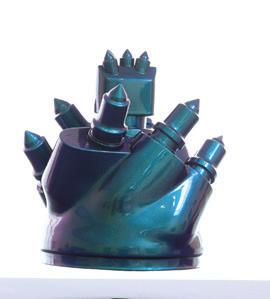
Are first impressions ever the whole story?
Find out how much can hide below the surface in our new exhibition, So it appears, organized by ICA Senior Curator by Sarah Rifky. Nineteen international artists and over 40 works challenge our assumptions, as viewers, inviting us into worlds within worlds. Scan here to learn more:
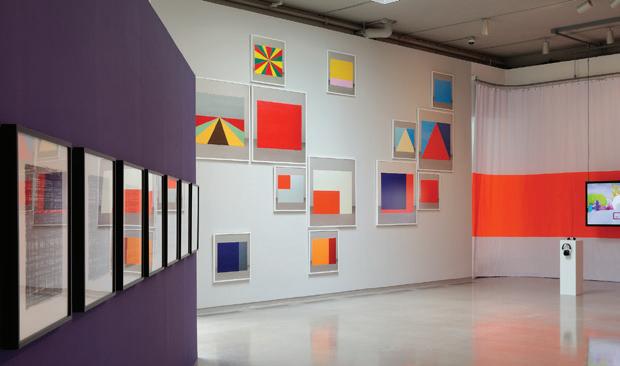
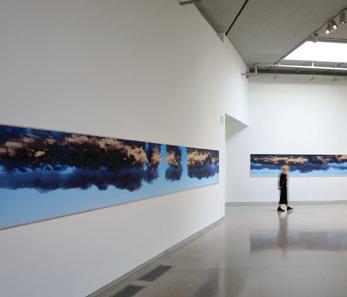
SPRING 2023
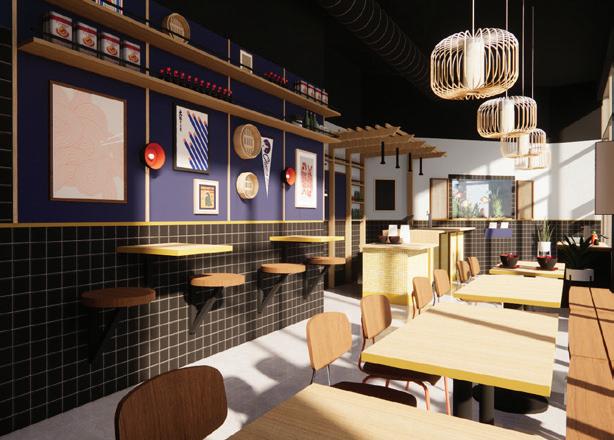
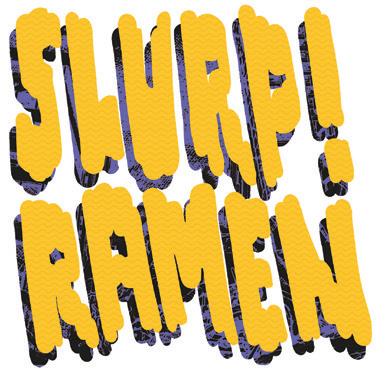
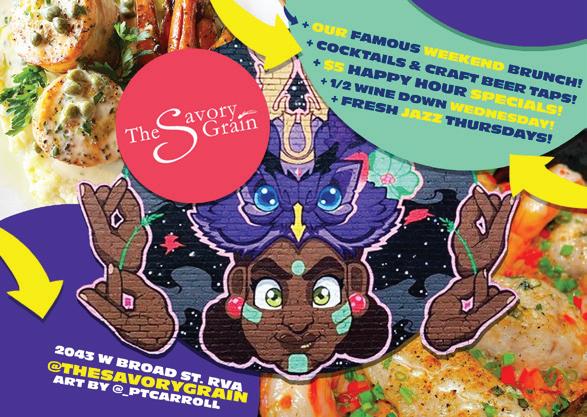


ISSUE 40 COMING TO CHURCH HILL SOONER THAN YOU THINK. 2416 JEFFERSON AVE. SLURPRAMENRVA.COM
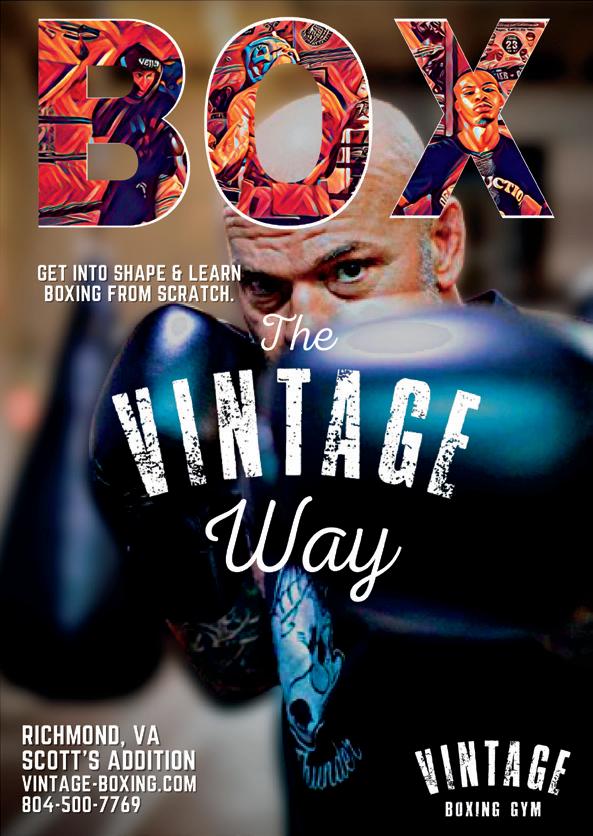
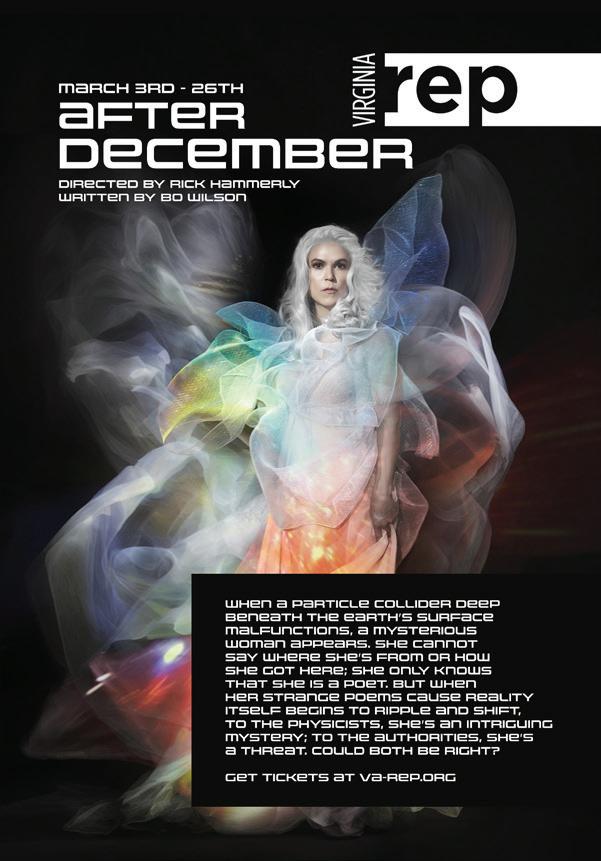

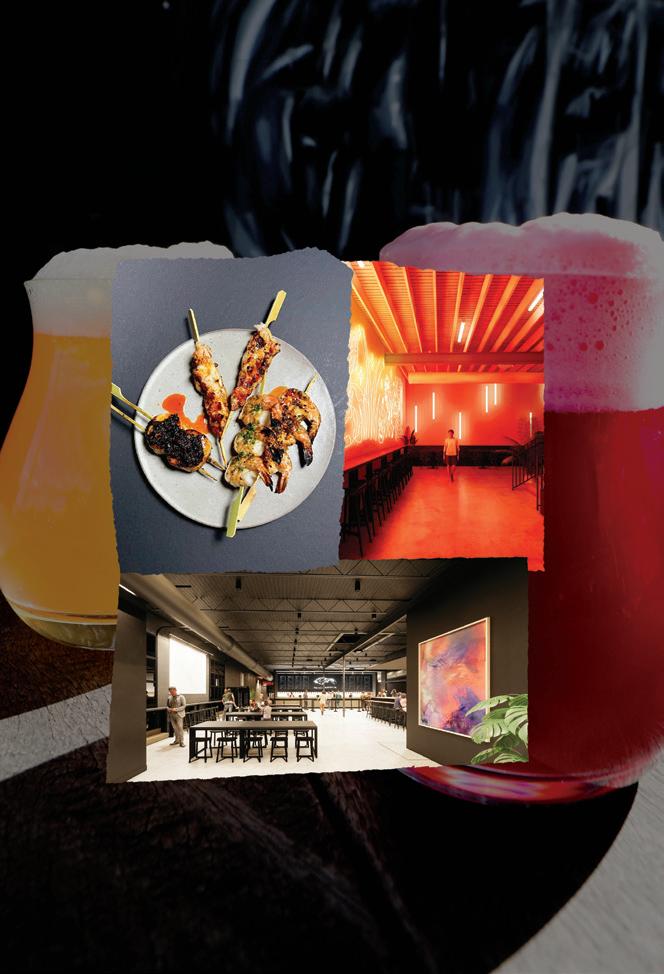
FEATURING A YAKITORI / JAPANESE PUB-INSPIRED MENU FROM THE CREATORS OF LONGOVEN @THEVEILBREWING | @NOKORIBIRVA FOR MORE INFO, FOLLOW:
























 Black Faux Leather Dress with CutoutsRotate Birger Christensen
Pink Stone EarringsLacroix
Black Faux Leather Dress with CutoutsRotate Birger Christensen
Pink Stone EarringsLacroix

























 BY R. ANTHONY HARRIS PHOTOS BY LARRY KONG & MYLES BROWN
BY R. ANTHONY HARRIS PHOTOS BY LARRY KONG & MYLES BROWN






















